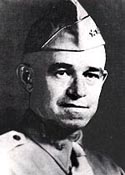
GEnEral Omar N. Bradley
Omar Nelson Bradley was born on February 12, 1893 in Clark, Missouri. He was the son of John S. Bradley, a farmer who used to teach sometimes, and Marie Elisabeth Hubbard.
15 years later, the family moved to Moberly, still in Missouri, where he met a girl who became his wife thereafter, Mary Quale.
He left West Point in 1915 and became Second-Lieutenant in the infantry. During the First War World, he temporarily served in the 14th Infantry Regiment as a Commander.
Bradley served in the National Guard in Hawaii and also as an instructor in West point.
In 1924, he studied at the School of Infantry in Fort Benning then taught again as an instructor in 1929.
He was noticed there by Lieutenant Colonel Marshall, future chief of staff of the American army. In 1934, he was admitted in the Army War College. His then slow career sped up at the beginning of the war.
He was promoted Sergeant-General temporarily in February 24 1941 and took the command of the 28HT Infantry Division.
On March 25, 1942 the 82rd Infantry Division was created, he took the leading of it until the 15 August 1942 date to which it became an airborne division.
In February 1943, he was Lieutenant-General and became the assistant of Einshower on the suggestion of Marshall, and then was in charge of the operations in North Africa. After the battle of Kasserine, Eisenhower named him assistant of Patton who was at that time the chief of the II Corps.
April 15, 1943, he succeeded to Patton to the head of the II Corps and fought in Tunisia then in Sicily. He gained a good control of the amphibian operations during the campaign of Sicily. That was partly why for this reason he was selected in October 1943 to take the command of the 1st Army which was supposed to land in Normandy. On August 1, 1944, this command went to General Hodges and took the head of 12th US Army Group. He kept that command until the end of the war.
After the war, Bradley succeeded to Eisenhower as the chief of staff of the American army in 1948 then became the president of the Committee of the chiefs of staff during the Korean war. He was then promoted General of the Army by President Trumann in September 1950, he was the 5th officer to accede this rank. He also served as the first President of the Military Committee of the North Atlantic Treaty Organization (NATO).
He left the army three years later. He became the chairman of Bulova Watch Company board.
During the Vietnam war, he was the advisor of President Johnson. He died in April 8, 1981.
General Bradley gave the impression to be more of a professor than a soldier. However he gained his reputation as a tactician and as “a soldier' S soldier”, a general whom the men of lower ranks could easily get inspiration from.